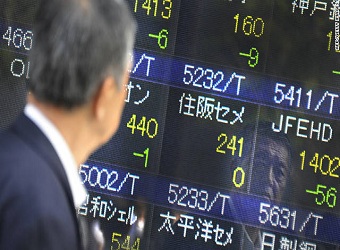Asian markets traded mixed on Tuesday, as investors remained cautious ahead of British Prime Minister Theresa May’s speech on Brexit and President-elect Donald Trump’s inauguration stateside at the end of the week.
In her speech, May is expected to outline plans for the United Kingdom’s plans to exit the European Union.
On Monday, British pound fell to three-month lows, following local media reports that suggested May will announced a “clean” and “hard” Brexit, pulling the country from European market and European customs union, in exchange for the ability to control immigration laws and leave the jurisdiction of the European Court of Justice.
“The PM is expected to walk a fine line between providing enough information on the government’s intentions, without necessarily showing too much of Britain’s negotiating hand ahead of official discussions with the EU,” said Rodrigo Catril, a currency strategist at the National Australia Bank, in a note.
The pound traded at $1.2046, up slightly, as of 10:28 a.m. HK/SIN on Tuesday. The euro gained against the pound, with the pair up 0.11 percent at 0.8803.
Japan’s Nikkei Stock Average traded down 0.50 percent, retracing some of its earlier losses of near 1 percent, while the Topix index slipped 0.66 percent.
The yen traded at 114.12 at 10:26 a.m. HK/SIN, retreating from an earlier session high of 113.81, but climbing from levels above 116 to the dollar in the previous week on safe haven demand.
“The yen was driven on the back of risk aversion as outsized movement on pound/yen was the primary driver,” explained Stephen Innes, a senior trader at OANDA, in a note. “There has been less focus on the dollar/yen pair after last week’s hefty position clear out.”
The pound/yen cross fell from levels above 140 in the previous week to about 137.47 on Tuesday morning Asia time.
The currency’s relative strength kept major Japanese exporters under pressure. Shares of automakers Toyota dropped 0.50 percent, Nissan was up 0.22 percent, after reversing losses of 0.6 percent, and Honda was off by 1.07 percent, while electronics maker Sharp fell 2.01 percent.
Across the Korean Strait, the Kospi bucked the downward regional trend to climb 0.57 percent.
Samsung Group shares appeared mostly steady, with Samsung Electronics up 2 percent, Samsung SDI up 1.3 percent and Samsung C&T down 0.4 percent. Samsung Engineering, on the other hand, declined 3.1 percent.
Seoul’s central district court is said to hold a hearing on Wednesday morning local time to decide whether it will approve an arrest warrant for the head of Samsung Group, Jay Y. Lee, after South Korea’s special prosecutors’ office accused him of paying millions of dollars in bribe to a friend of President Park Geun-hye.
Australia’s benchmark ASX 200 was down 0.79 percent in afternoon trade, with most sectors lower.
The financial sector was off 0.98 percent, with major banks selling off. Shares of ANZ fell 1.43 percent, Commonwealth Bank of Australia off by 0.86 percent, Westpac down by 0.85 percent and the National Australia Bank off by 1.06 percent.
Chinese mainland markets traded mixed, with the Shanghai composite down 0.14 percent and the Shenzhen composite up 0.06 percent. Hong Kong’s Hang Seng index advanced 0.36 percent.
In the broader currency market, the dollar strengthened against a basket of currencies to trade at 101.56, compared to its last close at 101.18. The Australian dollar fetched $0.7469, climbing from levels below $0.7350 last week.
In company news, Australian miner Rio Tinto released its fourth quarter and full year 2016 production results and provided guidance for 2017.
Iron ore shipments from Pilbara came in at 327.6 million tonnes for 2016, which was in line with guidance, and about 3 percent higher than 2015 numbers. For 2017, Rio Tinto expects Pilbara shipments to be between 330 and 340 million tonnes.
Meanwhile, mined copper production in 2016 climbed 4 percent on-year, but came in below expectations.
Shares of Rio Tinto fell 1.08 percent, erasing earlier gains of more than 1.2 percent. Other major resources producers also fell,with BHP Billiton down 0.11 percent and Fortescue down 2.37 percent.
Stateside, markets were closed Monday for a public holiday. But analysts said Donald Trump’s recent comments have done little to ease market concerns, particularly over the future of Sino-U.S. relations.
“While (his) comment that he wouldn’t name China as a currency manipulator on “day one” was seen as a positive.
He also said that his adherence to the One China policy depends on progress by China on trade issue,” said Catril, pointing out given Beijing’s sensitivity to trade issues, the comments have “not been seen as conducive to ease tension between the two countries.”
Source: CNBC
